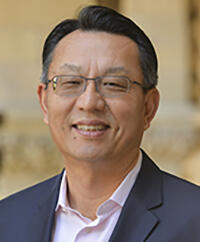Why North Korean Human Rights Matter: Book Talk with Robert R. King
“How can we engage with North Korea on human rights?” That is the question Robert R. King, former U.S. special envoy for North Korean human rights issues at the U.S. Department of State, has long been focused on. King, a visiting scholar and Koret Fellow at APARC in fall 2019, rejoined the Korea Program to discuss his new book, Patterns of Impunity.
In this volume, he provides an inside look into his time as special envoy, traces U.S. involvement and interest in North Korean human rights, offers insights into the United Nations’ role in addressing the North Korean human rights crisis, and discusses the challenges of providing humanitarian assistance to a country with no formal relations with the United States and where separating human rights from politics is virtually impossible.
King was joined by his longtime colleague Jung-Hoon Lee, South Korea's former Ambassador for Human Rights and the ROK’s inaugural Ambassador-at-Large for North Korean Human Rights. Watch their conversation:
Creating Accountability for Human Rights Crimes in North Korea
[Subscribe to APARC’s newsletters to receive our experts' latest updates.]
The Role of the Special Envoy
As the Biden administration begins to review policy towards North Korea in earnest, King’s book and perspectives are particularly timely. Drawing on over a decade of experience, King explains how the role of the special envoy provides a unique opportunity to influence the policy agenda on human rights. As a senior member within the U.S. State Department, the envoy is in a position to both elevate the importance of rights violations to policymakers in Washington and provide feedback on how policy decisions impact the situation on the ground.
King outlines several avenues where U.S. policymakers can increase pressure on North Korea to address the ongoing human rights crisis in the country. Predominantly among them is the recommendation to support the work on human rights already done by the UN and UN agencies, such as the reporting of Special Rapporteur Tomás Quintana.
“North Korea is very sensitive about its international legitimacy,” King notes. “Working through the UN and with UN agencies gives greater validity and acceptability to the human rights issues and puts greater pressure on North Korea to follow international norms.”
King’s other recommendations center more directly on the people of North Korea. He urges ongoing support for initiatives and agreements that foster access to information and proper distribution of resources and aid for North Koreans within the country along with freedom of movement for those who are attempting to leave and face crossing hostile borders into China.
Responsibilities in Seoul
Speaking as King’s counterpart and colleague in South Korea, Jung-Hoon Lee echoed the need for visibility and accountability — both globally and in South Korea — for the DPRK's human rights crisis. “In the public eye and the global context, the human rights condition in North Korea is not very familiar. Why? There’s no access. The North Korean society is completely cocooned. There are terrible human rights conditions in other parts of the world, but there is access in those cases to see what is going on. In North Korea, there are only testimonials. There are no pictures or documentaries of the gulags and atrocities. That’s why it is so important that we keep raising this issue.”
For Lee, this means working with and through many of the same channels that King points to, such as the UN, and recognizing as a global community the scale of the crimes against humanity being committed.
But it also means accepting responsibilities closer to home. Lee firmly rejects the opinion raised by the South Korean Foreign Minister that refocusing on North Korean human rights and reappointing an ambassador to fill Lee’s now-vacant position is “useless.” Such indifference towards human rights issues in North Korea is damaging, warns Lee, citing the scrutiny South Korea suffered during the recent Tom Lantos Human Rights Commission hearings before the U.S. Congress.
The Road Towards Accountability
Human rights are only one facet of U.S. policy toward North Korea, but we undermine the overall relationship with the North if the United States abandons human rights in pursuit of security or economic goals, writes King in his book. "Policy toward North Korea involves interrelated issues that we frequently separate for analytical purposes or because they are dealt with in different ways or by different means. But these issues are interconnected, and they are not really separable."
Ultimately, any meaningful action to address North Korea's human rights violations will require coordinated efforts from international organizations, national governments, and civic organizations. In the third and final part of the Korea Program’s spring 2021 series on human rights in North Korea, forthcoming on May 20, leaders from the private sector will discuss the challenges of bringing together independent actors and organizations to raise awareness and call for accountability in North Korea. Registration for the event is open to the public.
Read More
In his new book, "Patterns of Impunity," Ambassador King, the U.S. special envoy for North Korean human rights from 2009 to 2017, shines a spotlight on the North Korean human rights crisis and argues that improving human rights in the country is an integral part of U.S. policy on the Korean peninsula.

 FSI researchers strive to understand how countries relate to one another, and what policies are needed to achieve global stability and prosperity. International relations experts focus on the challenging U.S.-Russian relationship, the alliance between the U.S. and Japan and the limitations of America’s counterinsurgency strategy in Afghanistan.
FSI researchers strive to understand how countries relate to one another, and what policies are needed to achieve global stability and prosperity. International relations experts focus on the challenging U.S.-Russian relationship, the alliance between the U.S. and Japan and the limitations of America’s counterinsurgency strategy in Afghanistan.![[Top left] Gi-Wook Shin; [top right] Roberta Cohen; [bottom left] Tomás Ojea Quintana; [bottom right] Joon Oh](https://fsi9-prod.s3.us-west-1.amazonaws.com/s3fs-public/styles/727x409/public/hero/korea_un_north_korea_human_rights_hero.png?h=c4d9845d&itok=HNhbd4Ot)



 As U.S. Special Envoy for North Korean human rights issues from 2009 to 2017, Ambassador Robert King led efforts to ensure that human rights issues were an integral part of U.S. policy toward North Korea. In this book launch webinar, he will share his extensive experience as special envoy and insights into the U.S. role in addressing the North Korean human rights crisis. Ambassador King will be joined by Jung-Hoon Lee, Professor of International Relations at Yonsei University, who will talk about his role as Ambassador for North Korean Human Rights in the past. Professor Lee will remark on how the North Korean human rights issues have been impeded under the current government in South Korea.
As U.S. Special Envoy for North Korean human rights issues from 2009 to 2017, Ambassador Robert King led efforts to ensure that human rights issues were an integral part of U.S. policy toward North Korea. In this book launch webinar, he will share his extensive experience as special envoy and insights into the U.S. role in addressing the North Korean human rights crisis. Ambassador King will be joined by Jung-Hoon Lee, Professor of International Relations at Yonsei University, who will talk about his role as Ambassador for North Korean Human Rights in the past. Professor Lee will remark on how the North Korean human rights issues have been impeded under the current government in South Korea.












